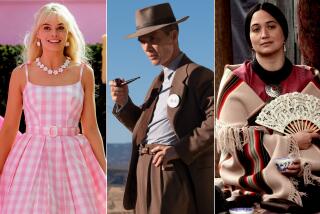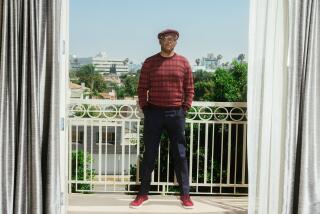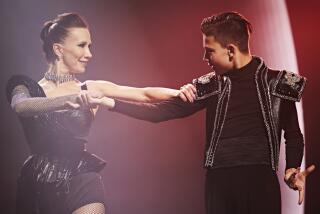Beyond the Swingers’ Image
The stars of HBO’s new movie, “The Rat Pack,” had a ring-a-ding-ding of a time playing Frank Sinatra, Dean Martin, Sammy Davis Jr., Peter Lawford and Joey Bishop.
“It was a lot of fun,” says Joe Mantegna, who is uncanny as Martin. “I remember on the last day of shooting, the five of us looked at each other and we said, ‘It’s going to be tough to put this one down. It would be nice to go on the road for six months, playing Vegas, Tahoe and Reno--take the act on the road.’ It was just that kind of fun to do.”
But if viewers are expecting to see a happy-go-lucky romp about five friends drinking, carousing with beautiful “dames,” hobnobbing with the mob, performing to adoring crowds, making hit movies together, wearing tailor-made suits, driving expensive cars and smoking one cigarette too many, they’re in for a surprise.
“The Rat Pack,” which premieres Saturday, tries to present the men behind the public images.
“When you are dealing with icons, the question people want to know is, ‘What aspects of the icon are true in terms of the public’s perceptions, and what are the nervous system and the heartbeat behind the icon hood I can relate to?’ ” says director Rob Cohen (“Dragon: The Bruce Lee Story”).
Written by Kario Salem (“Don King: Only in America”), “The Rat Pack” stars Ray Liotta as Sinatra, Mantegna as Martin, Don Cheadle as Davis, Angus MacFayden as Lawford and Bobby Slayton as Bishop.
The drama chronicles the Pack’s friendship with John F. Kennedy (William Petersen) and Sinatra’s Herculean efforts to get the Massachusetts senator elected president, only to be hurt and betrayed by the Kennedys.
“The Rat Pack” was not authorized by the Sinatra family, but Cohen believes his offspring will like the film.
“I think if they give it half a chance, they will see the affection and love and respect that is there,” says Cohen. “As well as a clear-eyed view of a man who felt the need to pursue John Kennedy and to do anything and everything that it took to create a relationship and to get on that level of presidential power, and some of the compromises that he did to get there.”
“The Rat Pack” was filmed earlier this year before the death of Sinatra on May 14. Cohen says that Sinatra’s passing has added new import to the film.
“I think the greatest impact of his death on the film was that, even more than when he was living, the mystery, the enigma of this man’s complex character is really of interest to the public,” Cohen says. “With his passing, the entire world realized there was a giant among us and just what an enormous life it was.”
Liotta (“Something Wild,” “GoodFellas”) was naturally nervous about playing such a legend as Sinatra.
“I might be from Jersey and I have light eyes, but I really don’t look like him,” says Liotta. “I didn’t know how they were going to approach him. I’m not a mimic.”
But when Liotta learned Cohen wanted him to capture the essence of Sinatra and not try to do an impression, his fears were quelled. “This is a great part,” Liotta enthuses. “[Frank] gets to sing ‘One for My Baby’ and campaign for JFK, make love to Ava Gardner and punch out reporters.”
Before filming, Liotta watched Ol’ Blue Eyes’ movies, TV specials, talked to friends and producers, went to his favorite restaurants, visited his old compound in Palm Desert and picked the brain of technical advisor comic Tom Dreesen, who opened for Sinatra for 13 years and appears in the movie.
“Then after that, you kind of have to get rid of [the information] and use a few ticks and mannerisms and have fun.”
Mantegna’s Martin is depicted as a man who was nothing like his image of a swinging boozer. He actually used apple juice in his whiskey glass instead of alcohol. A family man, he spent his nights watching TV in his hotel room, while the other Pack members were partying.
“To me the overshadowing thing about the piece is that, with all the fun, there is an element of tragedy as well,” says Mantegna, who is a lifelong fan of Martin and Sinatra’s.
“I feel the principal people who suffered were the people who were closest to them, like their families. In a way, it was an occupational hazard. If you think of the lives they led and the kind of time commitment they made to being who they were, someone had to get hurt.”
Tragedy also imbues Cheadle’s poignant performance as Sammy Davis Jr., who had to endure hatred from both the white and black communities after he fell in love and married white Swedish actress May Britt.
Cheadle says it was easy getting a beat on Davis, just being “a black man in America and kind of projecting what he went through at the time. He was enjoying all the benefits of the ‘American Dream’: fast cars, tons of money. He had the world on a string and white women, but at the same time he was much maligned for the very same thing--being called an ‘uppity n---r’ and an ‘Uncle Tom.’ So the conflict trying to bridge that schism was very torturous to him, to the extent that he couldn’t even keep his family together. So it was very detrimental to him personally.”
The glittering celebrity of the Rat Pack caught the attention of America at the right time, Cohen says. “The country was starved for glamour. The Truman and Eisenhower eras were about as unglamorous as this country ever got. These guys with their flash and their panache and their joie de vivre, they found that history was ready for them and they were ready to shape history. It all came together.”
“The Rat Pack” premieres Saturday at 9 p.m. on HBO.
More to Read
Only good movies
Get the Indie Focus newsletter, Mark Olsen's weekly guide to the world of cinema.
You may occasionally receive promotional content from the Los Angeles Times.











